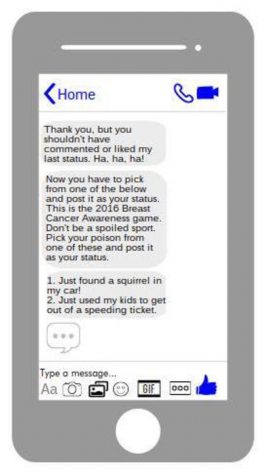Why posting about the squirrel in your car doesn’t solve breast cancer
October 15, 2016

No, those shocking posts about students finding squirrels in their cars, being accepted on MasterChef or becoming dads that overwhelmed Facebook feeds last week aren’t true. They are just the latest social media trend that may have started with good intentions, but ended up spreading an insensitive message.
In an “effort” to increase awareness for breast cancer, many students took to Facebook, posting different joke statuses with no apparent connection to breast cancer. The idea was that if someone liked or commented on the status update, the person who posted the status would inform them to post a similar status. The purpose was to spread awareness for breast cancer as more students would become informed about meaning behind these posts.
But what does finding a squirrel in your car or getting accepted on a gameshow have to do with breast cancer? Absolutely nothing.
None of these posts have any references to breast cancer and are easily misinterpreted as random jokes, which clearly does nothing to raise awareness. If the purpose was to raise awareness, these posts failed miserably, as the resulting discussions about the posts have not been about breast cancer, but about the hilarity of the trend itself. What might have started off as a campaign for awareness snowballed into a meaningless fad.
Since these posts became about the trend instead of the cause, the effect was downright insensitive. Rather than creating a positive buzz around breast cancer, these posts turned the cause into a joke. Such serious issues are deserving of more attention than simply being brushed over by an internet fad. Jokes are just something that should never be associated with serious illnesses. Ever.
Around one in eight women in the U.S. develop breast cancer in their lifetime, according to the American Cancer Society. Since so many families are impacted by the disease, joking around can easily offend members of the community, and people on social media need to be more cognizant of that.
If students wanted to make a positive difference in the fight against breast cancer, then they should genuinely post about the cause. To start, they could actually name the issue.
Students who really care about breast cancer should raise awareness by doing activities that honor the seriousness of the cause. Participating in breast cancer awareness month at school or walks for the cure are all ways that students can show their support without trivializing the illness they are trying to support.
No matter the intentions of students, these posts were grossly counterproductive. We all want to support the cause, but students must consider the unforeseen consequences of social media campaigns in order to actually make a positive impact.







Andrew • Oct 15, 2016 at 9:19 pm
These posts influenced me to learn more about breast cancer and donate money to breast cancer research. Neither of which is trivial or counterproductive, I think.